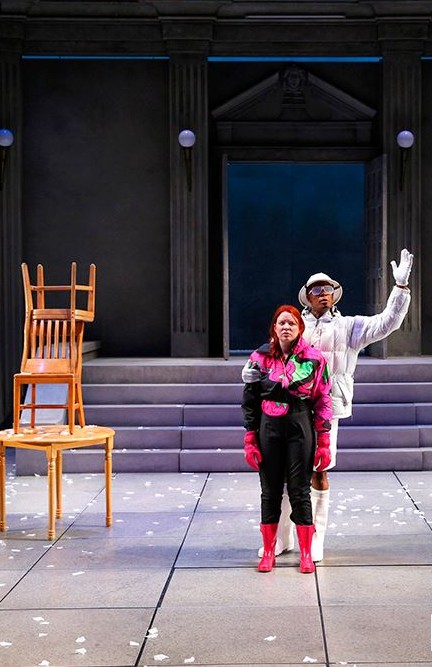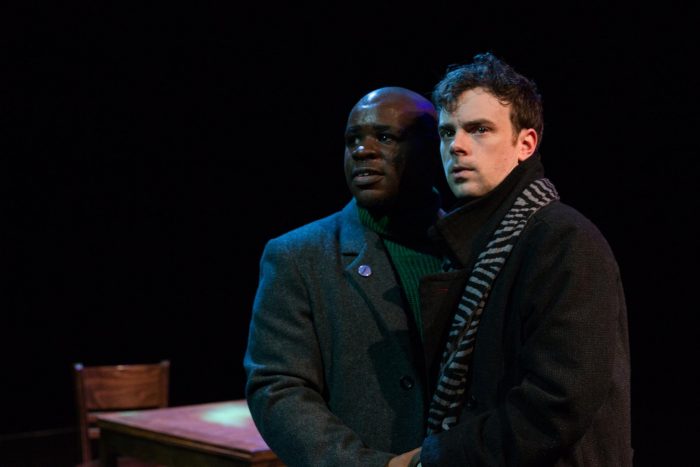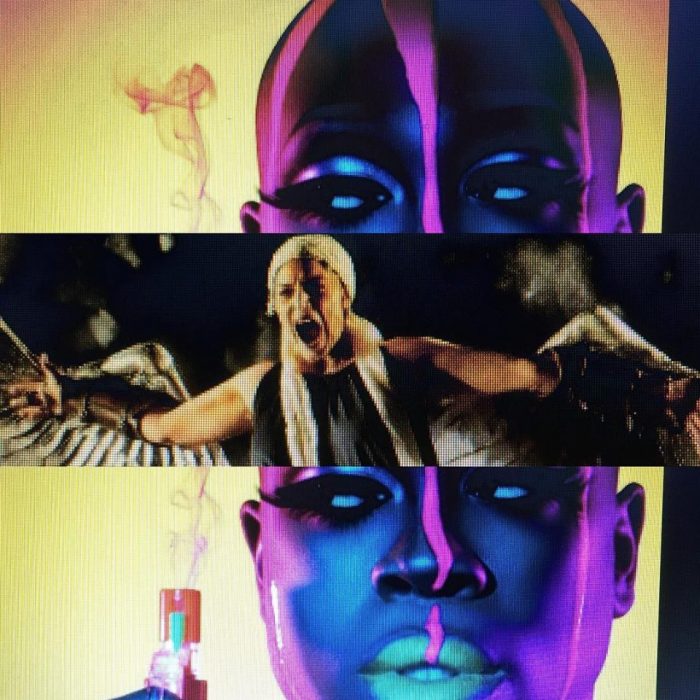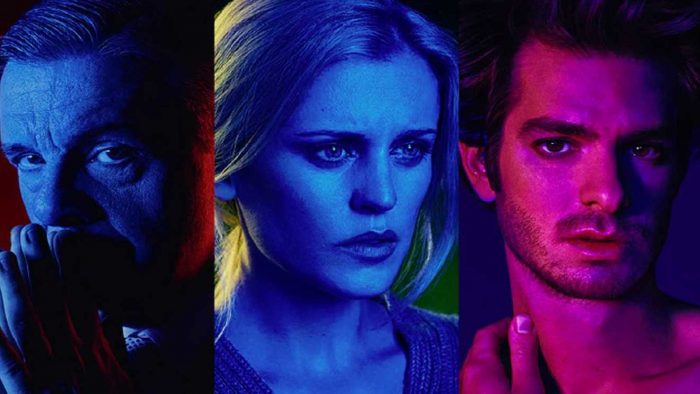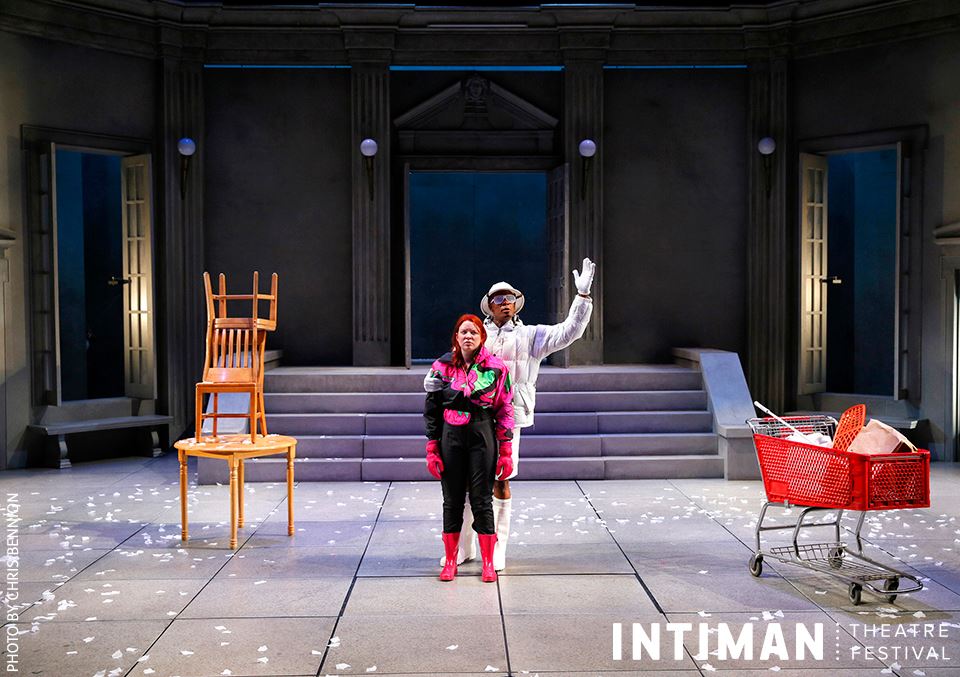
Alex Highsmith and Timothy McCuen Piggee in Intiman Theatre’s “Angels in America,” August 12 – September 21, 2014, at The Cornish Playhouse at Seattle Center. Photo: Chris Bennion
Review: “Angels in Amerca, Part One: Millennium Approaches” by Tony Kushner. Produced by Intiman Theatre Festival. Directed by Andrew Russell. With Anne Allgood, Charles Leggett, Ty Boice, Alex Highsmith, Timothy McCuen Piggee, Quinn Franzen, Adam Standley, and Marya Sea Kaminski. Now through September 21 at the Cornish Playhouse at Seattle Center.
Anticipation is a bitch. Or, a bastard. Or, both, if you prefer equality with your misogyny and misandry. Looking forward to something can only lead to one of two outcomes. Satisfaction that your (probably) high expectations were met, or crushing disappointment if they are not. I had admittedly huge expectations for Intiman Theater’s announced production of Tony Kushner’s masterwork play cycle, “Angels in America” which consists of two parts, “Millennium Approaches” and “Perestroika”. Mr. Kushner’s complex work is an erudite, blisteringly sharp look at life in late 1980s New York that confronts every possible hot topic you can think: medicine, politics, religion, law, sexuality, ethics, gender, race…you name it and Kushner weaves it into his fascinating narrative that includes closeted gay Mormon Republicans, the ghost of Ethel Rosenberg, AIDS infected drag divas, pill popping hallucinatory housewives and the reality of notorious conservative lawyer Roy Cohn. It’s a brilliant work that has been honored with praise, prizes and accolades since it debuted over 20 years ago. It especially resonates for the gay community and every self-respecting gay male theater nerd probably has a special connection to this work, either via a stage production or its acclaimed television adaptation on HBO in 2003. “Angels in America” is a canonical work and it’s one I highly revere. As I’ve stated, I had high hopes for Intiman’s production (it’s second actually; Intiman staged the Northwest debut of the plays over 20 years ago) and the opening of Part One, “Millennium Approaches” Thursday night at the Cornish Playhouse at Seattle Center. (Part 2, “Perestroika” will debut in September).
Unhappily, my expectations, which were great, were also ultimately disappointed. Intiman’s most recent “Angels” staging seems ill-formed, under rehearsed and not ready to take flight. It’s hampered by confused direction, a deadly pace and underwhelming performances that seem afraid to commit to Kushner’s complex text. It’s a long work but the pacing here is funereal; the first of its three acts was particularly draggy. I’m hoping that continued rehearsal and performances will tighten things up and some of the actors will continue to flesh out their performances but as it now stands, I really can’t commit to recommending this production, despite the expressed love from the opening night audience (which included our Mayor and his husband) and naturally featured the now obligatory standing ovation. It’s a bit of an unfocused mess.
Tough love demands a scapegoat and in this case I think maybe it’s director Andrew Russell, a one time assistant to playwright Tony Kushner. Perhaps his obvious love for the material has clouded some judgement, but there’s a lot of awkward staging in this production. In scene after scene, actors are placed in odd and inorganic placements that deaden the pace of the show. In scenes regarding movement, the actors are flailing all over the stage. Poor Alex Highsmith, as the pill popping Mormon wife Harper Pitt, is nervously twitching all over the stage like a Muppet on meth. Yes, she’s supposed to have nervous energy but it’s too unfocused and as a result her performance is largely one note.
But, the awkward staging abounds all over the production. A raunchy gay sex scene in Central Park between two characters was jarringly discordant, like Mr. Russell couldn’t make up his mind how to stage it. The actors were bouncing all over the stage like pin balls and the scene, which is supposed to be creepy, funny and sad all at the same time, just felt unfocused and uncomfortably performed by its two actors. It was painful to watch. And, that awkward staging happens periodically throughout the show. There’s no flow or rhythm to this production; it stumbles when it should soar and I think it’s largely due to Mr. Russell’s direction.
Sadly, many of the performances were also off their mark; most of the actors seem like they’re just not ready for public performances and still exploring their characters. Of the 8 actors in the play, who each play multiple characters, only Timothy McCuen Piggee seems to have a handle on his characters, a fantasy tour guide named Mr. Lies and the far larger and more important role of Belize, the former drag queen/current nurse and best friend of the main character, Prior Walter. His Belize is a fully formed and original performance that doesn’t try to mimic previous portrayals, notably by Jeffrey Wright who won a Tony Award on Broadway and the Emmy for the HBO version. The actor is also unafraid to tackle the role head on, to make it his own; his Belize is far more street smart and less arch than Mr. Wright’s yet fulfills the vision of the character as created by Mr. Kushner. It’s a fresh, lively performance that drastically energized the night and the primary acting highlight of this production.
Ty Boice is also strong in his primary role as the conflicted young Mormon lawyer, Joe Pitt, projecting both earnest ambition and soul crushing despair as he deals with his sexuality, a crumbling marriage, and the joint demands of being a Mormon and one of “Reagan’s Children” in the American judicial system of the late 80s. It’s an assured, compassionate performance and Mr. Boice has a strong grasp of the demands of the role.
Charles Leggett tackles the monumental role of Roy Cohn, (made famous by Ron Liebman on Broadway; Al Pacino on HBO), and beloved Seattle actress, Anne Allgood takes on the roles of Hannah Pitt, the dour Mormon mother and others including a Rabbi and Ethel Rosenberg, (Kathleen Chalfant played the roles on B’way/Meryl Streep on TV) and both actors seem hampered by the ghosts of previous portrayals. Mr. Leggett seems afraid to really get loud with the role; Cohn is an obnoxiously braying power mad golem and the actor seems hesitant to pull out the stops when the character rages. He’s also far too touchy/feely with the Joe Pitt character. As written, it’s obvious that Cohn has strong feelings for Joe, both emotionally and sexually, but the physicality between the actors in their scenes is excessive and inappropriate. As for Ms Allgood. she is also far too tentative in her approaches to her multiple roles; they also seem to blur together in a bland dourness. Again, it seems like she’s so terrified that someone might accuse her of “copying” Meryl Streep that she forgot to bring any sizzle to her performances; they’re underplayed to the point of tedium.
Marya Sea Kaminski is fine in her roles, as the sympathetic nurse, a chirpy Mormon realtor and a demented street person but her primary character as the Angel doesn’t real have much to do until the 2nd play, “Perestroika”. It will be interesting to see how the performance ripens and develops in part two.
As for the two actors who portray the ostensible lead, the AIDS ravaged Prior Walter and his very conflicted lover Louis Ironson, Adam Standley and Quinn Franzen respectively, I still think the same as I did when they announced their casting this spring; they should each be playing the other’s role. Mr. Franzen’s rosy cheeked cheer seems more appropriate, both physically and emotionally, for the role of Prior, and Mr. Standley’s brooding darkness for Louis. These two men, both collaborators at Seattle’s hip, young theater company, The Satori Group, are among the top young actors in Seattle. Each of them has crafted a well-respected reputation in Seattle theater circles for their assured work. And, both of them seem ill at ease in their roles and specifically, in gay roles, which is odd considering both men have given very strong performances as other gay and sexually questioning characters…including in last year’s Satori Group show, “reWilding” where they played a pair of very homoerotically inclined buddies. Their performances in “Angels” just feel awkward and over emphasized…struggling with inflections and gestures which really aren’t necessary to “play” gay. Again, I question the direction and whether or not they’re over awed by the material and their illustrious predecessors in these roles, or if they just haven’t had time to sufficiently craft their performances. My hope is, these two excellent actors will eventually “ripen” into their performances and feel more comfortable in these roles.
Technically, the show is strong. Robert J. Aguilar’s lighting design is effective. Jennifer Zeyl’s handsome Federal building facade set design is, well, quite handsome though not very flexible in establishing other locales. Matt Starritt’s sound design is also fine but frankly, the show could have used MORE of it. This production of “Angels in America” received a lot of press for hiring Seattle costume designer and artist Mark Mitchell to do the costumes and they’re fine, but the “big costume” in the show, The Angel in all her winged glory, is a bit of a disappointment. The gown seems like a wrinkled cast off from Mr. Mitchell’s acclaimed “Burial” exhibit at the Frye Art Museum from last year and the wings are a bit flaccid and not particularly dramatic. In fact, the celebrated ending of “Millennium”, which involves the “very Spielberg”-ish arrival of The Angel, was awkwardly staged. It was more whimper than bang and could have used more imaginative stagecraft. More Spielberg and less, “we’re out of time and money to make this theatrically exciting and emotionally dramatic”. It was a bit of a letdown.
Nothing about theater is easy. Producing it, designing it, directing or acting or promoting it…it’s all hard as hell. So is constructive criticism of theater, especially when writing about beloved, canonical pieces of dramatic literature. There can be an attitude of “how dare you criticize this work and this noble production?!?!” from both fans of the material and the theater company. But, in my opinion, “beloved canonical pieces of dramatic literature” demand an even stronger attention to artistic creativity and detailed execution of the work. Great words from great artists should inspire the interpreters in a theater company to do great work themselves….not, intimidate them into hesitant blandness. Intiman’s production of Tony Kushner’s “Angels in America” needed a bit more time and a lot more confidence before it opened. Hopefully, continued performance will increase their confidence and enhance this show and this great work of dramatic art.
The “Great Work” has begun…it just needs a bit more time to deliver what the Prophet has promised.


